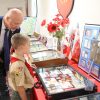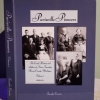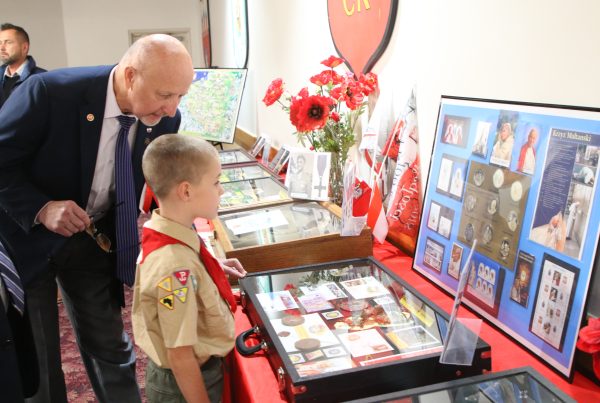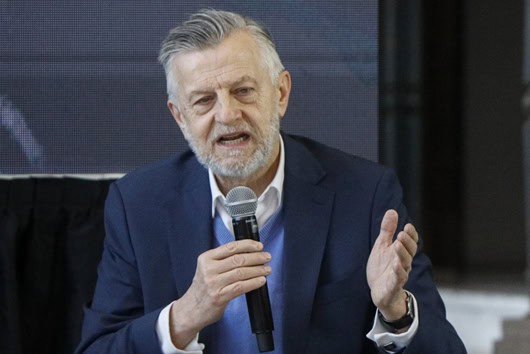Four members of Friends of Polish Art (FPA) – Barbara Lemecha, Brian Malski, Patty Malski, and Stella Szczesny – attended this year’s Convention of the American Council for Polish Culture (ACPC) which was held July 30 – August 2, in Buffalo, New York.
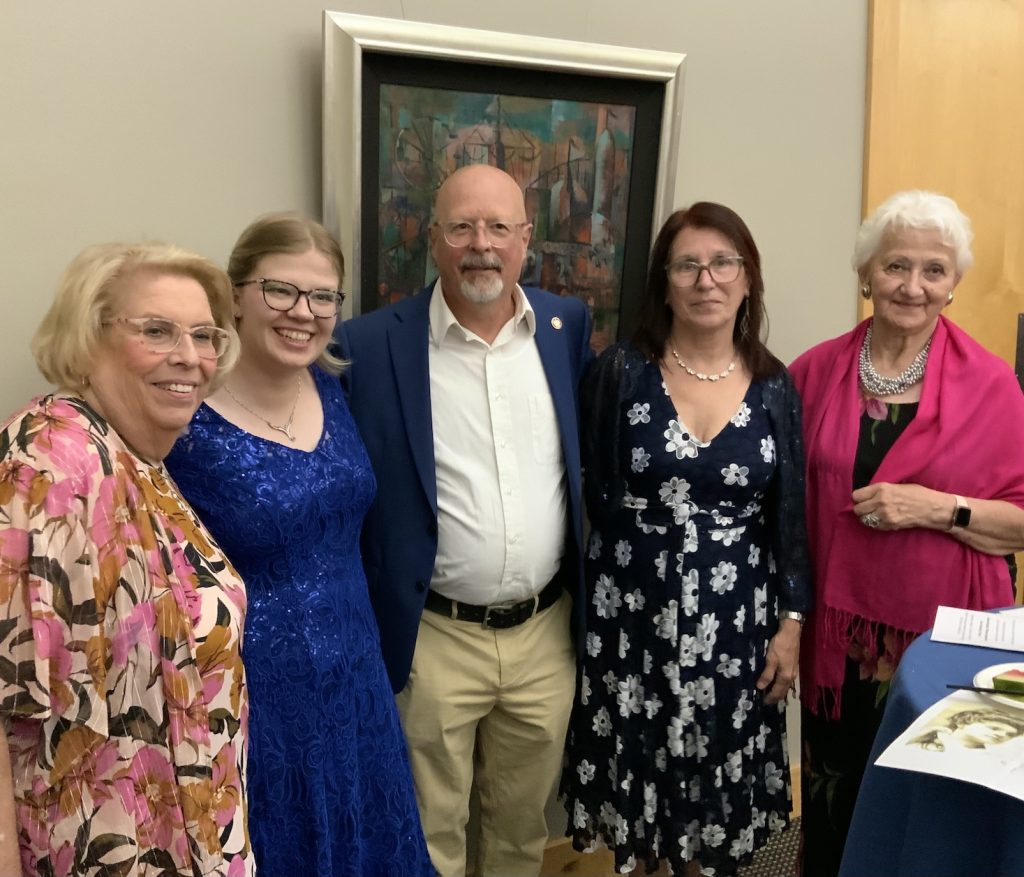
The ACPC is a national organization established in 1948 in Detroit for the purpose of “uniting numerous Polish American clubs, associations and institutes across the United States” and is “dedicated to inspiring appreciation, promotion and sharing of the rich culture, heritage and history of Poland. “(from the ACPC website)
This year’s convention – the 77th – was organized by the Polish Arts Club of Buffalo, which just celebrated its 80th anniversary. The convention theme was “Art & Architecture”, and its main goal, in the words of Celia Larkin, ACPC President, “celebrating our past achievements and planning our future”.
In the Metropolitan Detroit area only one organization, Friends of Polish Art, is an affiliate of the ACPC (out of 48 member organizations, 13 have this status.) However, three other locally-based organizations – the American Polish Cultural Society, the Piast Institute and the Polish Institute for Culture and Research – are “supporting members” of the ACPC. (For detailed information about membership levels and ACPC programs, activities, etc. check the ACPC website: https://polishcultureacpc.org/)

We asked the FPA delegates for their post-convention reflections. All four of them currently serve either on the ACPC Board of Directors or on ACPC committees: Brian Malski and Barbara Lemecha are ACPC Directors, Stella Szczesny is a past Director, now serving on the Affiliate Matching Funds Grant committee, while Patty Malski just became the coordinator for the ACPC Facebook page. As Patty jokingly stated, this new assignment was “her main take-away” from the convention.
Four-day-long annual conventions are where the delegates from member organizations learn about each other’s activities, exchange ideas, share experiences and get inspired. There is of course a good number of official meetings, but each affiliate organization, when organizing the convention, makes sure that the cultural program, showcasing their own local “gems”, is very exciting and that there are many opportunities to mingle with old, and make new friends.
In short, they put on the dog. It is an additional reason why the conventions leave their participants with many wonderful memories and a desire to attend the next one.
The 2025 ACPC Convention in Buffalowas Stella Szczesny’s fourth. In her opinion, shared by the other three FPA delegates, it was a very well-done event, during which a lot was accomplished, new officers were elected, and decisions were made about how to go forward.
Ms. Szczesny said, “I like the conventions because they are well organized, and they offer people special insights into the areas. In Buffalo, they gave us an excellent tour of the city’s architectural treasures, and a beautiful tour of the art museum. It was not just sitting and working on organization matters, but we got a flavor of the community that we were at, and the things they have to offer. We got to go out and really experience Buffalo, find out about its past, its present, and their plans for the future.”
An important convention takeaway for Brian Malski was learning about the Detroit-based Ralph C. Wilson, Jr. Foundation. Recently the Polish Arts Club of Buffalo received a grant from them and now FPA will consider applying once the right project comes to mind.
Also, very memorable for Brian, was the presentation by Henry Swiatek Jr. and his son Brett, whose company Swiatek Studios, since 1967 has been renovating old historical buildings such as churches, theaters, private residences and museums. Brian was fascinated by the quality of their work, as well as the work ethic expressed when they said:” We don’t want to be the biggest, we want to be the best.” What also impressed Brian, was the spectacular growth of this Polish American company, from very humble beginnings to a studio offering a full range of interior renovations (carpentry, stained glass, plastering, etc.)
The convention got Brian also very interested in exploring connections between Buffalo and Detroit. Among them was the discovery that Buffalo’s initially interconnected park system was designed by Frederick Law Olmsted, the same architect who designed Belle Isle Park. Also, the information about a planned renovation of Buffalo’s old rail station was interesting.
All four FPA delegates very excitedly talked about the visit to the Buffalo AKG Art Museum, where they viewed the “Northern Light” exhibit featuring Scandinavian and Canadian artists from the beginning of the 20th century, which just opened on August 1. The museum, founded in 1862, is the sixth-oldest public art institution in the United States and reopened in 2023, after a four-year-long expansion that transformed its campus into a striking, accessible, modern place.
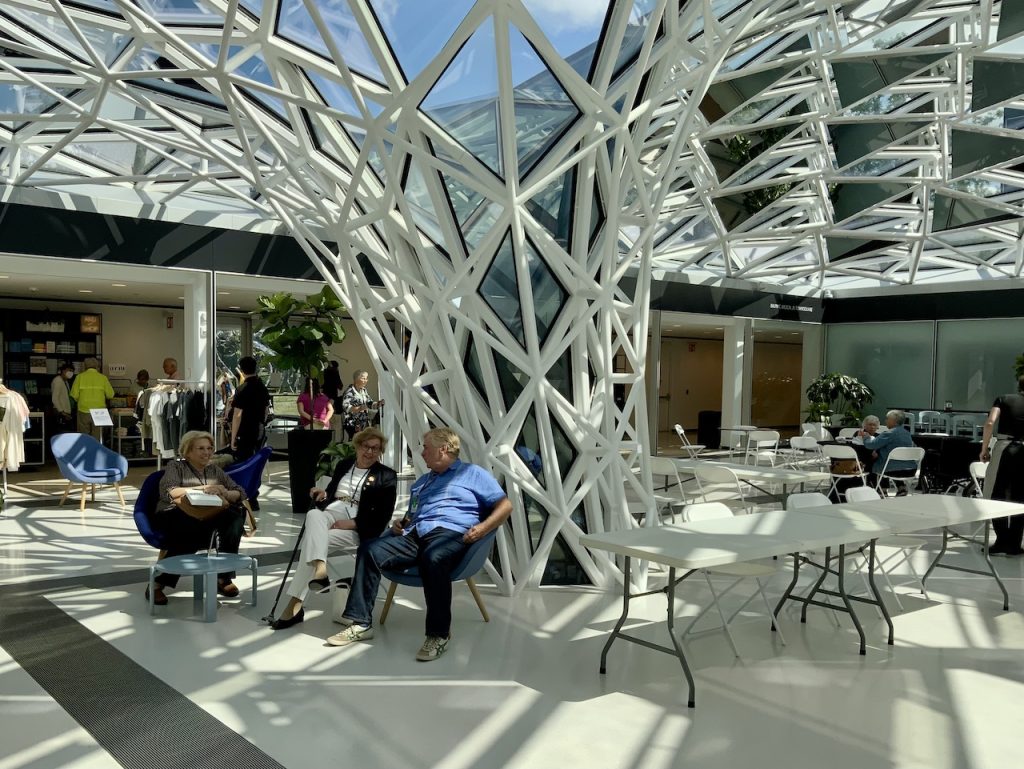


For Patty Malski, other great convention experiences included an excellent concert featuring mezzo-soprano Jules Furgal, this year’s winner of the ACPC Marcella Kochańska Sembrich Vocal Competition which took place at another architectural gem, the Montante Cultural Center, a former St. Vincent de Paul church. The recital was preceded by a classical guitar performance by James Piorkowski.
It was the fifteenth convention for Barbara Lemecha, an ACPC officer of many terms. In her words, every convention means work, but also gives their participants lots of pleasure. Attending filled Barbara with an immense sense of satisfaction coming from being around people who share a common goal of promoting Polish culture, from supporting each other in their efforts and getting inspiration from each other.
For six years (2004-2010) Barbara Lemecha with Henrietta Nowakowski, a fellow long-time FPA member, with passion and dedication shouldered the ACPC Polish Perspective Exhibit, at the National Council for the Social Studies. This flagship ACPC project, which started in 2000, calls for the development of materials and lesson plans about important, but often overlooked Polish contributions to science and culture and then manning the booth at the annual National Conferences for the Social Studies (NCSS). During these six years Barbara and Henrietta met with hundreds of teachers of geography, history, government and economics from all over the US, and encouraged them to include information about Polish contributions in their teaching, as well as supplied them with materials to do so. Their enthusiasm for the project continues to be infectious.

This very successful program was also discussed during the last Convention.
Another very important project discussed during the Convention was the participation of the ACPC in the 250th anniversary of the United States. It was already decided that for this reason next year’s convention will be held in Philadelphia; the preparations are under way.
Answering the question of how FPA’s work compares to the work of other organizations, both Stella Szczesny and Patty Malski pointed out that every organization has its own niche and does things that meet the needs of their community. Not everybody, for instance, organizes art contests and offers grants and scholarships the way FPA does.
Although membership in many organizations is decreasing, the convention participants felt optimistic about the future. Patty Malski,for instance, thinks that people who have children in high school, or younger, are too busy to join the organizations now, but once they are empty nesters and have more time, they will find their way into organizations. In addition, Stella Szczesny and Barbara Lemecha pointed out, that the number of ACPC members has been growing impressively, with just last year nine organizations joining, which is a big cause for optimism.
It is worth mentioning that FPA is one of the oldest organizations in the ACPC and has already sponsored several conventions (the last one in 2023). Stella Szczesny intimated that for 2028, for the ACPC’s 80th anniversary, FPA will try to bring the convention back to Metropolitan Detroit.
People often express concerns about the future of the Polish American organizations and predict their “doom and gloom”.
The reassuring answer from all four FPA delegates to these concerns was unequivocal: they came back invigorated, optimistic, with a renewed sense of purpose in their work and in the future of the Polish American cultural organizations.
Photos by Barbara Lemecha, Brian Malski and Stella Szczesny



